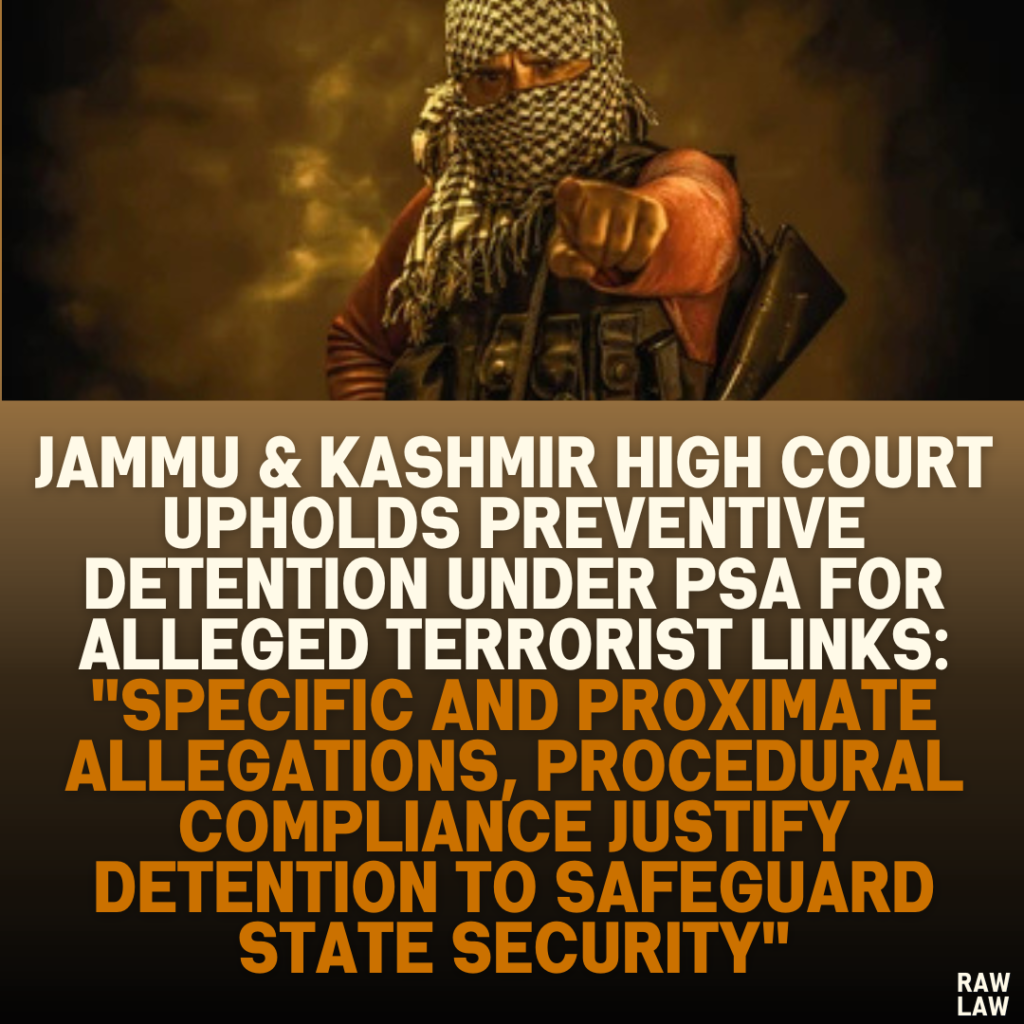Court’s Decision
The High Court of Jammu & Kashmir and Ladakh upheld the preventive detention of the detenue under the J&K Public Safety Act, 1978. The court ruled that:
- The grounds of detention were specific and substantiated, reflecting the application of mind by the detaining authority.
- The detention was based on proximate incidents and allegations that justified preventive detention.
- Procedural safeguards, including the supply of relevant materials and consideration of representation, were followed.
Thus, the court dismissed the petition challenging the detention order as being without merit.
Facts
- The petitioner challenged the detention order dated 04.08.2023 issued under Section 8 of the J&K Public Safety Act, 1978, by the District Magistrate, Pulwama. The detention aimed to prevent activities prejudicial to state security.
- The grounds for detention included:
- Involvement in a 2022 grenade attack on a police station in Pulwama.
- Alleged communication with Pakistan-based handlers, including a named individual, through social media.
- Connections with radical elements in the local area, specifically identified by their names.
- The petitioner argued that:
- The grounds were vague, based on outdated incidents, and lacked sufficient proximity to justify detention.
- Procedural safeguards, such as providing all material and considering the petitioner’s representation, were not adhered to.
Issues
The court addressed the following legal issues:
- Were the grounds for detention vague or lacking proximity to the detention order?
- Did the detaining authority exhibit non-application of mind?
- Were procedural safeguards, including the supply of all relevant materials and consideration of the petitioner’s representation, duly followed?
Petitioner’s Arguments
- Grounds of Detention: The petitioner argued that the grounds of detention were vague, lacked specific details, and were based on stale incidents that had no proximity to the detention order.
- Non-Application of Mind: It was contended that the detaining authority merely copied the police dossier without independent application of mind.
- Non-Supply of Materials: The petitioner claimed that all relevant documents forming the basis of the detention were not provided, preventing effective representation.
- Representation Ignored: The petitioner alleged that his representation against the detention order was not considered.
Respondent’s Arguments
- Justification of Detention: The respondents argued that the detention was warranted given the petitioner’s involvement in activities prejudicial to state security, including terrorism-related allegations.
- Compliance with Procedural Safeguards: It was submitted that:
- All relevant materials, including detention grounds and supporting documents, were supplied and explained to the petitioner in Urdu, Hindi, and Kashmiri.
- The petitioner’s representation was considered and rejected, with the decision duly communicated to him.
Analysis of the Law
- Grounds for Detention: The court emphasized that preventive detention under the J&K Public Safety Act requires proximity and specificity in allegations. It found that:
- The detention grounds referenced specific incidents, such as the 2022 grenade attack and named handlers and radical elements.
- These allegations provided sufficient justification for preventive detention.
- Application of Mind: The court examined the detention order and the police dossier, finding that:
- The detention grounds were not a mere reproduction of the police dossier.
- The detaining authority independently assessed and recorded its satisfaction regarding the petitioner’s activities.
- Procedural Safeguards:
- The court reviewed evidence showing the petitioner was supplied with all relevant materials and that these were explained in a language he understood.
- Documentation showed that the petitioner’s representation was considered and rejected, with the rejection communicated promptly.
Precedent Analysis
The court relied on established principles in preventive detention cases, including:
- The requirement of specific and proximate allegations to justify detention.
- The need for detaining authorities to comply with constitutional and statutory safeguards.
Court’s Reasoning
- Proximity and Specificity:
- The court held that the allegations, including the 2022 grenade attack and ongoing connections with handlers and radical elements, were proximate to the detention order issued in 2023.
- It rejected the petitioner’s argument that the grounds were vague, noting that specific individuals and incidents were identified.
- Independent Application of Mind:
- The court observed, “There is no similarity between the police dossier and the grounds of detention,” demonstrating that the detaining authority had independently assessed the case.
- Compliance with Procedural Safeguards:
- The court found evidence that the petitioner received all relevant materials and that these were explained in multiple languages.
- The petitioner’s representation was considered and rejected, and the rejection was communicated to him.
Conclusion
The High Court dismissed the petition, holding that:
- The detention order was legally valid and justified.
- Procedural safeguards were followed, and the grounds of detention were specific and proximate.
- The petitioner’s contentions lacked merit.
Implications
- Reaffirmation of PSA Principles: The judgment underscores the importance of specific and proximate allegations in preventive detention cases.
- Emphasis on Procedural Safeguards: The case highlights the need for strict compliance with procedural safeguards to ensure detainees’ rights are protected.
- Precedent for Future Cases: This decision reinforces the legal framework for preventive detention under the J&K Public Safety Act, setting a precedent for similar cases.
